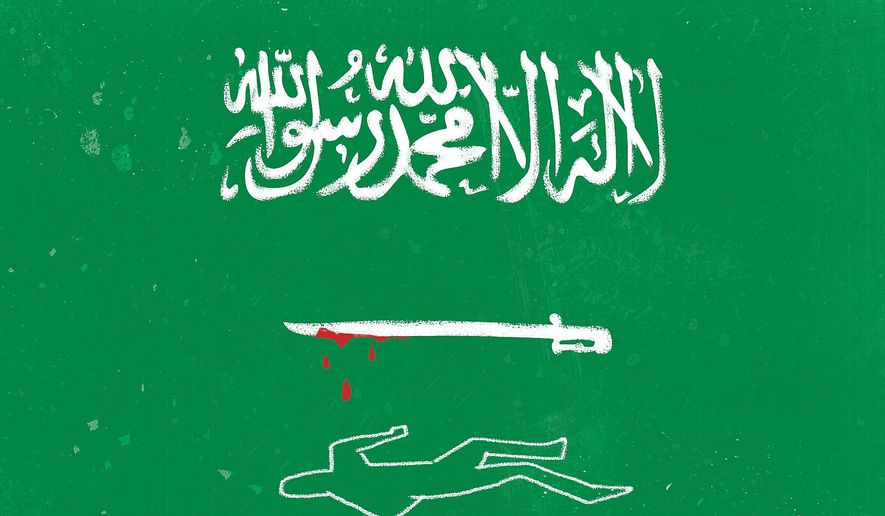OPINION:
In the wake of an apparent assassination of Saudi journalist Jamal Khashoggi, President Trump is judiciously restrained but has already said that this was a possible “hit” by the Saudis. This incident also serves to raise the fundamental nature of the U.S.-Saudi relationship — and how it has been mishandled for decades by prior administrations.
Aside from the glitz the young Mohammed bin Salman (MBS) puts on it, Saudi Arabia is very much still a totally corrupt, 12th-century feudal monarchy fueled by billons of petrodollars — making no serious contribution to the planet other than more oil and money. They avoid questions about their disgraceful treatment of women and minorities, and no one dares to speak about democracy or human rights.
For decades any analysis of the viability of the Saudi regime has been a taboo subject in Washington. This is in no small part due to the efforts of Prince Bandar bin Sultan, for many years the Saudi’s ambassador to the United States, and close friend to five presidents and numerous CIA directors. Not surprisingly, there was an unwritten rule in government to never speak evil of the Saudi regime, despite its hatred for Israel and Jews, support for terrorists, abuse of women, or even speculate about the long-term threats to the regime’s viability.
To make matters worse, the army of experts and consultants who inhabit the Beltway have fallen prey to the same delusion. Most are directly or indirectly supported by Saudi money or derive their incomes from U.S. government agencies that refuse to speak ill of the Saudis. The likely Saudi killing of Mr. Khashoggi may also force them to reconsider.
Since the emergence of “modern” Saudi Arabia in 1932, U.S. interests there have been entirely tied to oil, developed by U.S. corporations in the mid-1930s and resulting in a partnership known for most of its existence as “Aramco.” Between 1973 and 1980, the Saudis stole the U.S. half of the Aramco partnership, keeping billions of petrodollars for themselves. Despite this, and since at least 1973, U.S. policy has consisted of either treading very lightly, or of outright sucking up to the Saudis, this no matter what the actual politics or morality might be, lest the Saudis be offended and cut off the oil supply.
The reality is that Saudi Arabia is increasingly vulnerable and needs the United States a great deal more than the United States needs the Saudis — this as the United States has also become far more energy independent. The Saudi regime faces increasing internal and external threats, largely from Iran, and desperately needs both intelligence and military support. The United States should be in the driver’s seat in dealing with this corrupt regime.
Following Sept. 11, 2001, the United States looked to the Saudis as an ally in the “Global War on Terror.” Far less attention was paid to the facts that many of the 9/11 al Qaeda terrorists came from Saudi Arabia and that Saudis have long been major financial sponsors of terrorist organizations. Since 9/11 the United States has pushed to stem the lethal flow of Saudi cash to terrorists, but success is far from complete.
Since the 1973 Middle East War, the United States has half-heartedly attempted to enlist the Saudis in the process to achieve an Arab-Israeli peace. As a U.S. “ally” the Saudis should have been urged to stop funding organizations seeking Israel’s destruction, and play a more positive role with their Arab allies in the region. However, for a nation that does not recognize Israel, and has an overt national policy of anti-Semitism it would have been silly to expect more.
Militarily the Saudis have been a major customer for U.S. arms and aircraft but have done little with them to support allied interests. Most recently, they have taken to nonsensical bombing in Yemen causing the death of at least 1,700 Yemini civilians with no perceived strategic or political progress. The massive collateral damage has been all but ignored by the media, presumably well-greased with Saudi money to bury the story.
There is simply no escaping what Saudi Arabia is — and what it is not. The nation has no political parties — national elections are not permitted — and, according to The Economist’s Democracy Index, the Saudi government is the seventh most authoritarian regime from among the 167 countries rated. No amount of political spin can change this. The Saudi record on human rights is appalling to say the least. Saudi justice still consists of chopping off hands and heads as part of sharia law. Any pretense of the nation evolving into a modern democratic state is not credible.
With the Middle East increasingly in crisis, the United States must have a more realistic strategy and diplomatic approach to Saudi Arabia. Also, critical here are intelligence estimates of the near and longer-term viability of the Saudi regime, not unlike that undertaken with respect to Yugoslavia before the death of Tito. A version of this estimate should also be made available to inform the public debate.
The United States should not maintain the Saudi charade any longer. A realistic policy needs to be based on honest intelligence estimates, telling the truth to the American people about the Saudi role in funding terrorism and a serious assessment about what role the Saudis can play in the Middle East.
Killing the journalist Khashoggi makes complete sense for a Saudi government deathly afraid of the truth getting out. Unfortunately for them, their hit squat appears to have bungled the operation resulting in one more ugly truth coming out. The time for this arrogant ally may be coming to an end.
Abraham Wagner served in senior national security positions.




Please read our comment policy before commenting.